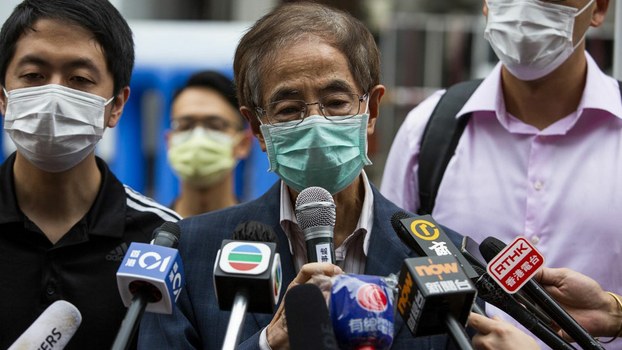




Hong Kong's Bar Association on Monday hit out at claims by Chinese officials that Beijing's liaison office in the city were authorized to play a "supervisory" role in its daily political life, and the running of its government.
The HKBA said the ruling Chinese Communist Party's liaison office is subject to the city's mini-constitution, the Basic Law, which bars interference in the city's internal affairs by Chinese government departments.
It dismissed earlier claims from Chinese officials in Hong Kong that the ban doesn't apply to them.
The ongoing war of legal opinions came as Hong Kong police arrested 15 prominent pro-democracy figures in connection with large, peaceful street protests last year calling for fully democratic elections, among other demands.
Article 22 of the Basic Law states: "No department of the Central People's Government and no province, autonomous region, or municipality directly under the Central Government may interfere in the affairs which the Hong Kong Special Administrative Region administers on its own in accordance with this Law."
The Basic Law also sets down the principle that Hong Kong shall be accorded a "high degree of autonomy" in running its own affairs, with the exception of foreign policy and defense.
"The effect of Article 22 is to prohibit interference in the internal affairs of [Hong Kong] by any part of the [Chinese government], which is itself bound by the provisions of the Basic Law, being a national law of the People's Republic of China," the HKBA said in a statement on its website on Monday.
It said public comments made last week by officials of the Hong Kong and Macau Affairs Office (HKMAO) and Beijing's Central Liaison Office had claimed that the two bodies aren't subject to the law, as they are "authorized by the central government to handle Hong Kong affairs."
Officials also claimed the right to "exercise supervision and express serious views" on Hong Kong affairs, the HKBA said.
'Deep public unease'
"Regrettably, the recent public statements made by the [Liaison Office] and the [Hong Kong] government on such a highly important legal issue have caused deep public unease," the Bar Association said.
"There would appear to be no question but that the HKMAO, being an administrative agency of the State Council of the PRC, and the [Liaison Office] ... are bound by the Basic Law, including the prohibition of interference in the internal affairs of [Hong Kong] under Article 22," it said.
"There is no provision in the Basic Law which confers on [them] the power of 'supervision' over affairs which the [Hong Kong government] administers on its own," the statement concluded.
Barrister Martin Lee, who founded Hong Kong's Democratic Party, one of those arrested and bailed at the weekend, said the claim that the two offices were exempt from Article 22 made "no sense."
"It is impossible to argue that these two organizations aren't bound by Article 22 of the Basic Law," Lee said on Monday. "No matter how high their status, they are still under the central government [in Beijing]."
"It makes no sense for them to pretend."
Civic Party lawmaker Alvin Yeung agreed.
He said that government statements at the time that Beijing's Liaison Office changed its name from the Xinhua News Agency Hong Kong bureau made no mention of a supervisory role for the office.
"Back then, [China's cabinet] the State Council issued a news release which clearly stated the role and responsibilities of the Central Liaison Office," Yeung said. "There was no mention of supervising the Hong Kong government."
Beijing is now the 'driving force'
Chung Kim-wah, assistant professor of social policy at Hong Kong's Polytechnic University, said it was likely no accident that the pronouncements on the status of the Liaison Office and the arrests of pro-democracy figures had come at the same time.
"The Hong Kong government is no longer the main driving force here," Chung said. "This isn't even coming from the pro-Beijing faction."
"I think it's a natural outcome of the Hong Kong government's incompetence ... so now we have Beijing taking the helm," he said.
Members of the U.S. Congress hit out at the weekend's arrests.
"At the urging of Beijing amid a global pandemic, the Hong Kong government has opted to arbitrarily arrest 15 pro-democracy activists," Sen. Marco Rubio said in a statement.
"If Chief Executive Carrie Lam would like us to believe that Hong Kong remains deserving of its special status, then she must lead in a
different direction," he said.
"The true test of Hong Kong’s autonomy is what happens when Beijing demands absurd arrests, intimidates judges and [lawmakers], or claims the Basic Law no longer limits their interference."
Sen. Jim Risch said the arrests, along with growing pressure for Hong Kong to enact anti-sedition and anti-subversion laws, were "troubling developments" for the rule of law in the city, while Sen. Cory Gardner called on the administration of President Donald Trump to look at imposing sanctions on those violating human rights in Hong Kong.
Reported by Man Hoi-tsan and Lu Xi for RFA's Cantonese and Mandarin Services. Translated and edited by Luisetta Mudie.